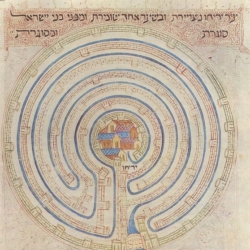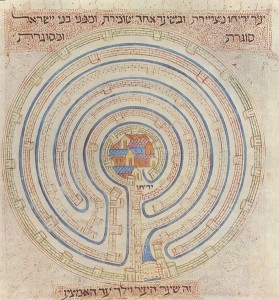| Initials (Hebrew) | Source (Hebrew) | Translation (English) |
|---|---|---|
אב״ג ית״ץ |
אָנָּא, בְּכֹֽחַ גְּדֻלַּת יְמִינְךָ, תַּתִּיר צְרוּרָה. |
Source of Mercy With loving strength untie our tangles. |
קר״ע שט״ן |
קַבֵּל רִנַּת עַמְּךָ, שַׂגְּבֵֽנוּ, טַהֲרֵנוּ, נוֹרָא. |
Your chanting folk raise high, make pure, accept our song. |
נג״ד יכ״ש |
נָא גִבּוֹר, דּוֹרְשֵׁי יִחוּדְךָ, כְּבָבַת שָׁמְרֵם. |
Like Your own eye Lord keep us safe, Who union seek with You. |
בט״ר צת״ג |
בָּרְכֵם, טַהֲרֵם, רַחֲמֵי צִדְקָתְךָ תָּמִיד גָּמְלֵם. |
Cleanse and bless us, Infuse us ever With loving care. |
חק״ב טנ״ע |
חָסִין קָדוֹשׁ, בְּרוֹב טוּבְךָ נַהֵל עֲדָתֶֽךָ. |
Gracious source Oh holy power! Do guide your folk. |
יג״ל פז״ק |
יָחִיד, גֵּאֶה, לְעַמְּךָ פְּנֵה, זוֹכְרֵי קְדֻשָּׁתֶֽךָ. |
Sublime and holy One Do turn to us, Of holy chant. |
שק״ו צי״ת |
שַׁוְעָתֵֽנוּ קַבֵּל, וּשְׁמַע צַעֲקָתֵֽנוּ, יוֹדֵֽעַ תַּעֲלוּמוֹת. |
Receive our prayer, Do hear our cry, Who secrets knows. |
[בלחש] בָּרוּךְ שֵׁם כְּבוֹד מַלְכוּתוֹ לְעוֹלָם וָעֶד׃ |
[whisper] Through time and space Your glory shines. Majestic One |
The piyyut אנא בכח (Ana b’Khoaḥ) is one of a handful of medieval ḳabbalistic poems providing a forty-two-lettered divine name acrostic, the first letters of which reference a litany of angelic names found in twin tomes Sefer haPeliah and Sefer haQanah (14th c.). Reciting these piyyutim thus serve as a “safe” circumlocution for the invocation of the power inherent in this combination of letters.
The earliest recorded printing we could find of Ana b’Khoaḥ dates from the mid-16th century, from one of the earliest Sefaradi prayerbooks printed after the Spanish expulsion. The authorship of the piyyut remains unknown and it was likely written in the 15th century.
Ana b’Khoaḥ is often linked to the authorship of the 14th century ḳabbalistic tome, Sefer haPeliah, due to a reference to a different 42-letter divine name piyyut found there. The 42-letter divine name is already mentioned in earlier sources including Ḥai Gaon, but the first attribution of an unspecified 42 letter divine name is to the Tanna, Rebbi Neḥunyah ben haQanah. For this reason, both the authorship of the Sefer haPeliah and the piyyut Ana b’Khoaḥ are commonly misattributed to him. (He is also sometimes attributed the authorship of the Sefer haBahir.)
At neohasid.org, Rabbi David Seidenberg has collected a handful of niggunim for singing this prayer including the tune offered by Reb Zalman. For more on the 42 letter divine name and Ana b’Khoaḥ, please enjoy Ben Newman’s article, here.
Rebbi Neḥunyah ben haQanah< is considered to have been a chief transmitter of an esoteric Jewish lineage in antiquity, the Yordei Merqavah (Descenders to the Chariot). See Rabbeinu Bachya’s commentary on Leviticus 16:30, in which he shares the significance of the first three letters of this prayer. Regarding the attribution to Rebbi Neḥunyah, Rabbi Ben Newman writes:
In some siddurim and books this prayer is referred to as ‘The prayer of Nehunah b. Hakanah,’ a tanna of the second generation of the Tannaim. However, this prayer is not mentioned in the writings of the rabbis, not in the Mishnah, not in the two Talmuds, and not in the Midrash Halakha or Aggadah. If the editor of the prayer “Ana be-Koach” was the tanna R’ Nehunia b. Hakanah, it is a wondrous thing, how the prayer became known to the community only in the late Middle Ages. For it does not appear in the Siddur of R’ Amram Gaon, or in the Siddur of R’ Sa’adia Gaon, or in Machzor Vitri, or in the Machzor of Varmisa….or in the Abudraham, or in the Siddur of R’ Hertz Shatz…Also, in many other ancient siddurim and machzorim it is absent…Also though the Sefer HaKanah refers to the 42 letter name it does not refer to “Ana b’Khoaḥ.”…It seems that when they attribute this prayer to R’ Nehunia b. Hakanah, they are referring to the order of the letters avgitatz…these are what are attributed to R’ Nehunia b. Hakanah…[1] From Ben Newman: “For this reference in Isaac of Acco, see his supercommentary to Ramban’s Torah commentary, Meirat Einayim pp. 152-155 (ed. Goldreich). Also see Tikkuney Zohar 19, p. 40a”
—Aharon Varady
Source(s)

Notes
| 1 | From Ben Newman: “For this reference in Isaac of Acco, see his supercommentary to Ramban’s Torah commentary, Meirat Einayim pp. 152-155 (ed. Goldreich). Also see Tikkuney Zohar 19, p. 40a” |
|---|

“אָנָּא בְּכֹחַ | Ana b’Khoaḥ, a 42 letter name piyyut with a singing translation by Rabbi Zalman Schachter-Shalomi” is shared through the Open Siddur Project with a Creative Commons Attribution-ShareAlike 4.0 International copyleft license.










Comments, Corrections, and Queries